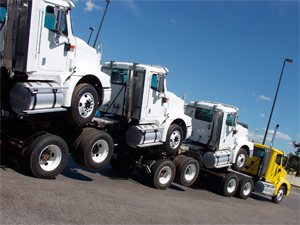 Sometimes, means of transportation need transportation themselves. Moving vehicles often falls to car haulers. Within the trucking industry, these transport groups serve special purposes. They have to move heavy machinery, safely, over long distances. So, as a professional car hauling service, you must work professionally. That means carrying commercial auto insurance. But you also must understand the parameters of your job. How do you meet these goals?
Sometimes, means of transportation need transportation themselves. Moving vehicles often falls to car haulers. Within the trucking industry, these transport groups serve special purposes. They have to move heavy machinery, safely, over long distances. So, as a professional car hauling service, you must work professionally. That means carrying commercial auto insurance. But you also must understand the parameters of your job. How do you meet these goals?
In the end, your coverage will depend on specific qualities of your job and vehicle. However, in many ways, your policy will align with standard commercial auto insurance. Start with standardized coverage but know when to expand your protection. There are several types of coverage specific to haulers.
What’s Car Hauling?
Car haulers are professional truckers who transport vehicles on their trucks. Generally, the vehicles in their care cannot drive under their own power. These might be new cars on their way to a dealership, or wrecked vehicles going to scrap yards. Other car haulers transport specialty vehicles (such as race cars) that don’t go on standard roads. Still others might assist companies or individuals in moving their vehicles cross-country.
Haulers differ a bit from tow operators, though they have many similar attributes. Rather than towing a single vehicle, many haulers can tow multiple. They also often use specialized trailers and cabs to do so, leading to more value in the enterprise.
Furthermore, haulers often transport vehicles that don’t necessarily have anything damage. Though you can haul disabled vehicles as well, hauling new ones changes the nature of your load. If you haul a new vehicle, you transport significantly more value than if you haul a wrecked one.
Depending on the specialty of your hauling business, your insurance needs will vary. Car haulers have to think about the value attached to their own vehicles, and the property in their care.
Insuring Your Vehicle Appropriately
You have the task to move a vehicle that belongs to someone else. If you damage it, you create a liability risk because you damaged someone’s property. Haulers who do so could face financial losses.
To safeguard your operations, you have to insure your trucking business appropriately. As a commercial driver, you likely have a requirement from your state to carry auto insurance. Nevertheless, going without protection is never a wise decision anyway. Driving accidents could cause significant business losses if you go without insurance.
By getting coverage, you can protect:
- Yourself, as the driver of the truck.
- The trucking company for whom you operate.
- Other drivers on the road, in case you cause an accident in which they become involved.
- The owners of the vehicles you transport.
With coverage, you can cut damage costs, medical and legal fees from mishaps. Insuring each of these risks will require specialized types of insurance. These might include:
- Collision coverage: Pays for repairs or replacement of your own truck following accidents or wrecks.
- Comprehensive protection: More hazards than accidents can damage your truck. This pays for damage from perils like fire, theft, vandalism, weather and other mishaps.
- Liability insurance: Your state will likely require all drivers to carry minimum amounts of this coverage. Yet, as a trucker, you’ll likely need more coverage than the minimum limits. Liability insurance pays for damage that you cause others if you are at-fault for an accident. Most liability policies include:
- Property damage liability insurance to help replace damaged property, like other cars
- Bodily injury liability coverage helps pay for other people’s injuries
- Medical payments insurance/personal injury protection (PIP): This coverage helps pay for your own injuries following accidents. However, it likely won’t replace your standard health insurance. Yet, it can supplement your protection.
These types of coverage apply to most commercial drivers. However, truckers will likely need additional protection specific to their job. Coverage to ask your agent about includes:
- Cargo protection: Can insure the vehicles in your care.
- Bobtail insurance: If you use your truck recreationally, this coverage extends to those uses.
- On hook protection: Covers vehicles under tow.
- Trailer liability insurance: Insures damage caused by the trailer.
- Garage coverage: Protects vehicles stored while in your care. For example, if you place a vehicle in a garage, and a fire then burns the garage and car, this coverage can help you.
Keep in mind, you cannot cover your truck with standard auto insurance. Your policy has to come from a specialized commercial auto insurer. It must also apply to truckers, car haulers specifically. Therefore, discuss the needs of your business with your insurance agent. Independent operators, contractors and trucking services will all need varying coverage. Your insurance agent will therefore need to tailor your protection.
Don’t hesitate when it comes to selecting insurance. It’s often better to invest in slightly more coverage than you need. However, your Georgia trucking insurance agent can help you determine which coverage strikes the right balance. Once you have that, you can continue to haul knowing you have appropriate support behind you.
Budget Insurance Agency can help you get the Georgia trucking insurance you need.
Here When You Need Us
Don’t hesitate to get a trucking insurance quote on a personalized Budget Commercial Trucking Insurance Quote in Macon, Georgia right now! Contact us at 855-218-6308 or request an online quote right now!

Do you have the correct trucking insurance? Check out our blogs about trucks.